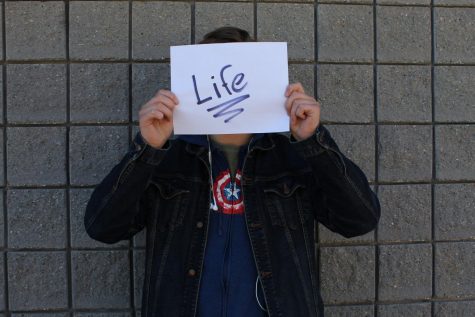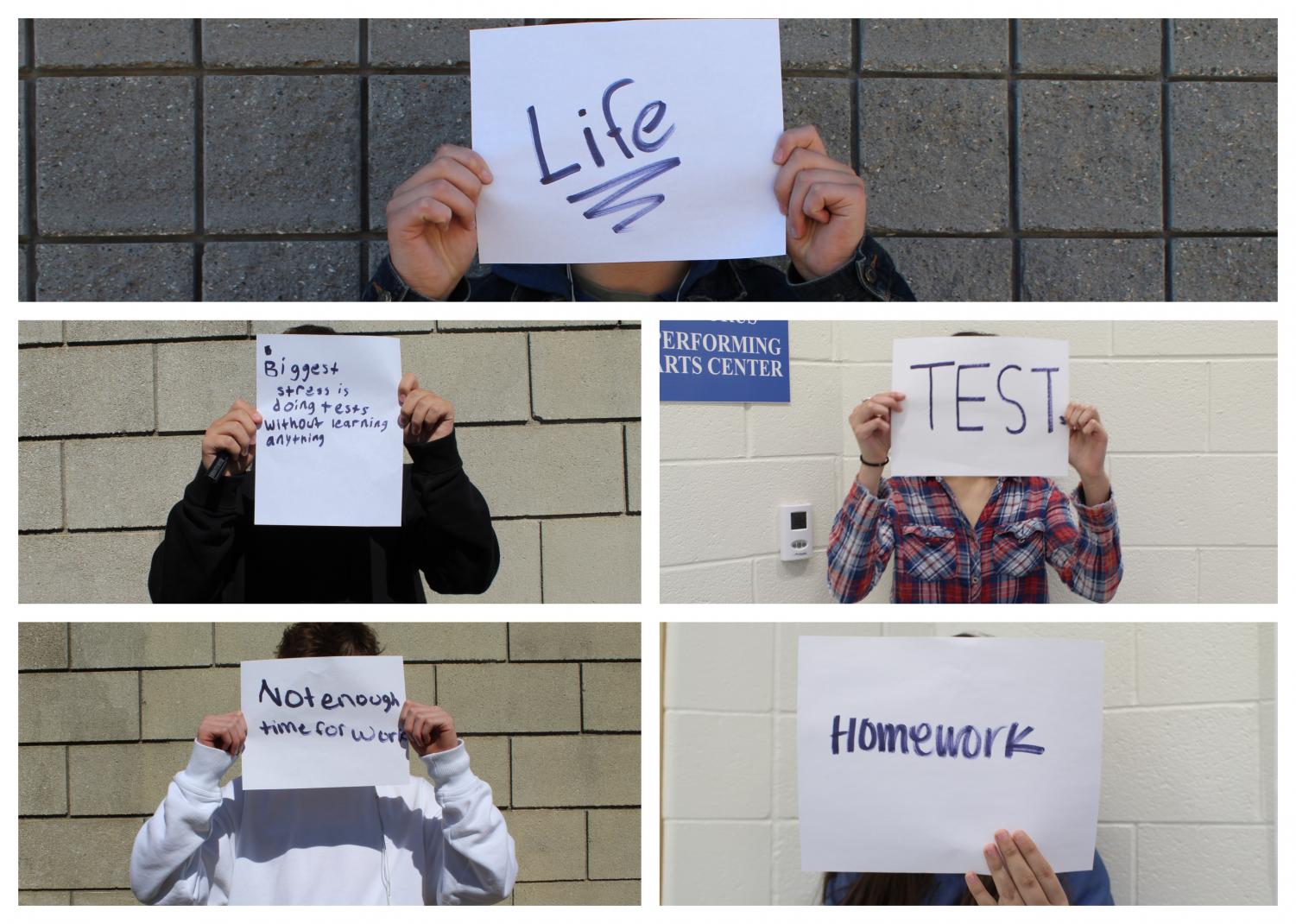Almost Invisible
Numerous high school students today walk through school, trying to conceal their thoughts and emotions. Their worries are obscured underneath plastic smiles. Almost as if they were invisible.
December 10, 2018

A: Senior Sidney Jones took a moment to say, “I haven’t really noticed that”. Senior Mahitha Chintacala continues, “it depends on person to person… and here I don’t think it’s about looks, I feel like it’s more about your gpa”. Jones then adds, “And your personality, but even then, people who aren’t nice still have a lot of friends”. Mahita clarifies her opinion by stating, “I don’t think it’s about personality or looks, it’s more about grades”.

A: Senior Joseph Woodtke remarks, “Life in general. I mean different situations cause different things, so I guess it depends on my situation and my day”.
It’s common for teens to struggle with low self esteem and insecurities, and they may not feel comfortable revealing their struggles to close friends or family; they often attempt to hide their troubles. On the other hand, some students feel unbothered talking to people they trust about their issues and insecurities. However, there are issues that are harder to detect, since the root of the problem is buried deep within that person. Several teens have major mood swings, and desperately attempt to control constant anxiety. They battle to eliminate derailing suicidal thoughts and have enormous trouble concentrating – the list goes on.
This is immensely tragic because behind people’s straight faces, they’re experiencing countless challenges. A large range of mental illnesses exist, and the appalling fact is that an abundant amount of adolescents do not get the support and medical help they need. However, that should change because everyone deserves to lead a life that makes them happy.
Since students are unaware of those who are going through rough times, everyone should try to be generous and friendly to others, so that no one will have another reason to be stressed and feel low. Teens shouldn’t feel dreadful or uncomfortable going to school, because it is their learning environment; a place for students to support each other and build a connection. Freshman Ethan Wickman revealed what causes the majority of his stress. “School, homework, and work in general,” he says, “I just don’t like school”. Similarly, Senior Joseph Woodtke, whose response is quoted in the second image, unmasked the culprits of his stress. “Life in general. I mean different situations cause different things, so I guess it depends on my situation and my day.” The students’ opinions reveal how the pressures of high school can very well impact your daily mood.
High school students can often be very judgemental and intimidating. Most of the time, they don’t accept people with issues, or unique individuals. I’ve personally noticed this at South Forsyth, and while it may feel as if I’m imagining people’s critical stares, it is likely the reality. As a girl, I’ve experienced society’s excruciating demands, and the constant struggle to be accepted. If you’re too shy, or not deemed as “good looking”, it is much more difficult to fit in. Being pretty, bubbly, and confident means being admired; a difficult feat for many teenage girls. At the young age of 14 to 16 years old, accepting and ignoring negative or cruel comments is a tough task. Having a broken spirit and feeling like a complete outcast can impact mental well-being tremendously, even more so at an early age, even if it seems like a small issue to everyone else.
According to the results from interviews I conducted at South Forsyth, almost all 7 students expressed that their peers are not judgemental, and that they believe everyone fits in somehow. Only 1 individual from the interviews suggested that others at school can be judgmental, while 2 other participants provided alternate opinions. When I asked a senior student, Joseph Woodtke, his standpoint on fellow students’ tendencies to judge, he stated, “they can be, yes”. On a similar note, I inquired whether or not he believes disparate individuals fit in; he declared, “well not necessarily, there are different groups”. His answer supports the viewpoint that not everyone is overcritical, and that distinctive students don’t consistently stick out of social circles, because there are a large variety of groups. Responses from seniors Sidney and Mahita, conveyed that they personally haven’t observed people who stand out from the rest, and as they believe, GPA and grades are the most significant factors in determining how you’re perceived by others. Their views revealed an interesting perspective on criteria for fitting in, because a lot of teens would suggest personality and/or looks are more significant. Their opinions are quoted in the first image.
The notion that the majority of people are hypercritical, and create a constant cycle of insecurities, is supported by Allure.
“Allure conducted a national survey of 2,500 people. They found that 64 percent of people said that the first thing they notice about someone is how attractive he or she is. Many people believe that appearance defines us significantly or completely. Some of what Allure found proves that beauty has an ugly side”.
Feeling judged and abnormal can cause social anxiety, low self esteem, and possibly trigger depression. Psychology Today emphasizes components of low self esteem, and further addresses the issue by stating that not only girls feel extremely insecure.
“According to Real Girls, Real Pressure: A National Report on the State of Self-Esteem, commissioned by the Dove® Self-Esteem Fund, seven in ten girls believe they are not good enough or do not measure up in some way, including their looks, performance in school, and relationships with friends and family members… According to the National Longitudinal Study of Adolescent Health, published in Psychology of Men & Masculinity journal, teenage boys excessively worry about their body image, which is a risk factor for depression among adolescent boys”.
While it is explained that not being accepted by others lowers students’ self esteem, and debilitates mental health, it also negatively affects their academic performance. UTNEWs suggests that the social lives of adolescents is crucial to their performance in school.
“‘Because social experiences in high school have such demonstrable effects on academic progress and attending college, the social concerns of teenagers are educational concerns for school,’ says sociologist Robert Crosnoe”.
Subsequently, teen’s insecurities are likely to cross over into adulthood, and if the issues they undergo are not addressed, there is a high possibility that it could cause several other problems.
Psychology Today cautions, “An alarming fact, considering the potential harmful effects of teenage insecurities and low self-confidence. Trouble sleeping, aggression, withdrawal, clinical anxiety, and depression are among the issues that insecure teens struggle most with”.
Personally, I do struggle with anxiety, and high school hasn’t been my brightest experience; I’m constantly worn out from overthinking and feeling cautious all the time. I feel as though I can never relax around people, even my friends. I’ve also come across different types of people who I either didn’t fit with or that brought me down. This greatly impacted my mood over time, ultimately leading to a downfall in grades, my energy level and self esteem also plummeting towards the ground. I finally realized that I needed to seek help, and eventually things improved a bit because I took that first step of reaching out.
Unfortunately there aren’t enough solutions for many adolescents to fight mental illness, but there are multiple reasons as to how it starts. Several factors including genetics, majorly stressful event(s), relationships, social lives, along with the huge workload at school and much more, can influence the onset of mental illness. Additionally, a large quantity of people – specifically teens – do not have access to mental healthcare, which eventually leads adolescents to commit suicide in numerous cases. Statistics provided by the MHA and National Institute of Mental Health (NIMH) prove adolescent suicide rates.
The MHA, suggests that “63.1% of youth with major depression do not receive any mental health treatment…6 out of 10 young people who have depression and who are most at risk of suicidal thoughts, difficulty in school, and difficulty in relationships with others do not get the treatment needed to support them”. Provided by the National Institute of Mental Health (NIMH), “The Centers for Disease Control and Prevention (CDC) WISQARS Leading Causes of Death Reports in 2016: Suicide was the second leading cause of death among individuals between the ages of 10 and 34”. The NIMH also suggests that in 2016, approximately 13.69% of deaths from suicides were comprised of ages ranging from 10-24.
What some people may not always remember is that mental illness is not something the person can recover from alone. It’s not a “phase” that typical teens go through, and shouldn’t be brushed off by peers and adults around them. During difficult times, a strong support system is crucial, as well as medication and therapy. Without that, the teen will suffer even more. In addition, as the years progress, education is becoming more advanced, with an increasing amount of competition between students and workloads as well. Since almost every student takes more than one AP class a year, there should be a period during every school day where students are allowed to destress; which IF fits perfectly. At South Forsyth HS, the only IF period is on Wednesday for 2 hours.
However, IF periods should be more frequent during the week, to at least 30 minutes a day with the exception of the two hour period on Wednesday. Doing this will allow teens to have time in the day to relax, so they feel even a bit of ease. As mentioned previously, mental illness is something that is not always apparent, and can be concealed from view, so people may not realize that even the person sitting next to them could be fighting through mental issues. That is why mental health is almost invisible.
